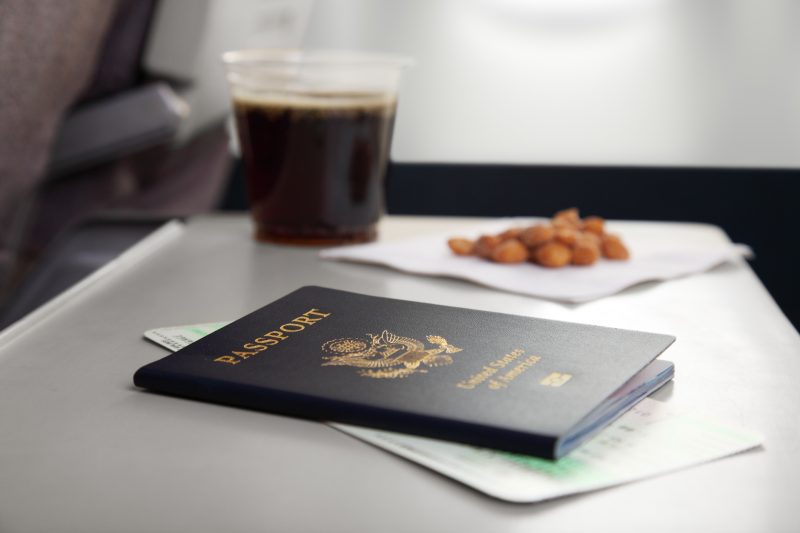The EU bans U.S. travelers: What that means & where you can go instead
Signing up for credit cards through partner links earns us a commission. Terms apply to the offers listed on this page. Here’s our full advertising policy: How we make money.
The European Union announced it will ease restrictions on non-essential travel and allow residents of just 15 countries to enter their borders. But their list is pretty exclusive, and the United States didn’t make the cut.
This may seem like a downer, but if you’ve caught the travel bug during quarantine, don’t let the E.U. ban stop you from hopping a flight or booking a hotel, because there are many other international locations open to U.S. residents.
Here’s everything we know about the travel ban and our top five travel destinations (outside of the E.U.) that you can visit now.
Note: The U.S. government still advises against non-essential international travel. If you do travel internationally, make sure to check with your physician, follow health officials’ guidance and research local travel restrictions before you decide to book a trip.
What is the European Union travel ban?
In a nutshell, the travel ban means that as long as coronavirus cases continue to steadily increase in the U.S., the majority of Europe is off-limits to U.S. residents. For the 15 countries the E.U. has permitted, starting on July 1st, 2020, residents will be able to visit for tourism and non-essential purposes. For the United States, non-essential travelers will be kept out of these countries until the travel ban is lifted.
The European Union includes 27 European countries, and Schengen states like Iceland are also participating in the ban, so U.S. residents are not permitted in over 30 countries for the foreseeable future.
How long is the ban in effect?
The E.U. stated that the ban will be re-evaluated and updated every two weeks, allowing for more countries to enter as they meet the criteria the E.U. has created. Countries are evaluated on the basis of the epidemiological situation and containment measures, including physical distancing, as well as economic and social considerations, according to the report.
The E.U. specifically looks for available information on COVID-19 (such as test numbers, containment and treatment reporting), a steady 14 day decline in positive cases and a number of new cases to be below the E.U. average in a country. When a country meets these standards, its residents will be permitted to enter.
As of right now, there is no clear date or timeline for when U.S. residents will be able to enter the E.U. again.
Where other options do Americans have?

A travel ban on over 30 countries might seem like it limits travel options, but there are still amazing destinations Americans are allowed to travel to. Here’s a list of countries and US territories currently (or about to) open to US tourists:
- Antigua and Barbuda
- Aruba
- The Bahamas
- Barbados
- Bermuda
- The Dominican Republic
- French Polynesia
- Jamaica
- Puerto Rico
- The Maldives
- Mexico
- St Barths
- St. Lucia
- Saint Maarten
- St. Vincent and the Grenadines
- Seychelles
- Turks and Caicos
- Turkey
- The U.S. Virgin Islands
We’ve highlighted a few of our favorites and how they’re accommodating tourists during this turbulent time:
Aruba

On July 10th, 2020, the happy island will officially open its borders to all leisure travelers from the United States. Aruba relies heavily on the revenue from tourists and is eager to get the industry back up and running post-coronavirus.
The opening comes with restrictions to keep everyone on the island healthy and safe, but it’s only a few extra steps to add to your travel to-do list. Those visiting Aruba need to apply for an Embarkment/Disembarkment card to enter. The process requires the following to be completed:
- Provide basic information
- Complete a personal health assessment
- Present a negative COVID-19 test (or you take one at the Aruba airport)
- Present insurance coverage
- Consent to Aruba’s government rules.
As long as you fulfill these requirements and test negative for COVID-19, the island of Aruba welcomes tourists with open arms. The government encourages you to have your mask handy and follow social distancing protocol on the island. Besides that, you’re free to enjoy the sunny weather, beautiful beaches and lively entertainment Aruba has to offer.
Insider Tip: Check out Million Mile Secrets’ tips on how to arrive and stay in Aruba using points and miles!
Barbados
Non-essential travel to Barbados is expected to return on July 25th, 2020, with flights leaving from major hubs in the United States, like New York and Miami.
Similar to Aruba, there are a few stipulations for travel. All travelers entering Barbados must present a negative COVID-19 test within 72 hours of commencement of travel. Additionally, Barbados has its own version of an Embarkment/Disembarkment card that travelers get by answering questions about their personal health. This card and the negative COVID-19 test certificate must be kept with you at all times while in the country. Barbados offers travelers a variety of activities to partake in during their stay — everything from adventure courses, to beaches, to taste-tests of traditional island food are available to healthy tourists.
The Maldives
Tourism is the biggest contributor to the economy of The Maldives, and the president of the country announced he is excited to kick start the industry on July 15th, 2020 when it re-opens its borders for all international tourists.
The Maldives are taking a variety of measures to curb the spread of COVID-19 as they invite tourists back, and have elected to open up in phases. All travelers must book with tourism establishments that have been registered and approved by the Ministry of Tourism for the Maldives. Additionally, all travel accommodations must be booked on tourist-only/resort islands starting July 15th, 2020 until hotels, resorts and rental homes on inhabited islands open for bookings on August 1st, 2020.
Additionally, a health declaration card must be completed on the flight over and anyone displaying symptoms of COVID-19 will not be admitted to enter the country.
The Maldives is 99% water and only 1% land, so it’s the perfect destination for those who enjoy the beach, the thrills of the water, or want a luxury getaway with beautiful ocean views. There are plenty of great points hotels in the Maldives where you can get great value from your points, like the Park Hyatt Maldives or the St. Regis Maldives.
St. Lucia
This Caribbean island is excited to welcome back tourists and has been operating with open borders for U.S. residents since June 4th, 2020.
Like other island and tropical destinations, St. Lucia will require presentation of a negative COVID-19 test upon arrival. Tourism is an industry St. Lucia takes seriously, as it accounts for 65% of total GDP. Therefore the island wants to keep tourists safe and has required all hotels, taxi services and tourism groups to apply for COVID-19 certification, where they will be assessed by the government and deemed eligible to accommodate tourists. The country is only in phase one of its reopening plan, so things like rental cars and indoor dining will not be available. Additionally, masks are required in public settings.
Until July, 31st, 2020 when phase two starts and more things begin opening, St. Lucia will be a relaxing, lowkey getaway. Not too many tourist attractions and sites are currently open, (but a few can be booked through your hotel) but you shouldn’t have a problem enjoying beaches or pools around the country.
Turkey

The Turkish government announced the reopening of its borders on June 11th, 2020 and Turkish Airlines has restarted some of its nonstop flights between Turkey and the U.S. and will resume more U.S. routes through July.
The country has developed a Safe Tourism initiative to ensure travelers and citizens are healthy and safe during their time in Turkey. The program includes thermal temperature checks upon arrival, government-certified safe accommodations, restaurants and tour/transfer vehicles. All guests of the country will be required to wear masks and maintain social distancing protocols throughout their stay.
Istanbul has recently reopened it’s Grand Bazaar, one of the largest markets in the world. That, along with the plethora of shops and museums, could make Turkey a great destination for someone looking for a more fast-paced and exciting city getaway.
Insider Tip: Turkish Airlines has a great rewards program, and you can transfer Citi ThankYou points to them for incredibly cheap mileage redemptions!
Things to consider before booking a trip
You may get stuck or have to quarantine in a country if you contract the coronavirus
While travel is fun and exciting, the pandemic isn’t over and there’s still a chance you’ll contract the coronavirus while traveling. Throughout your trip, make sure you are conscious of your surroundings, wear a mask and maintain social distancing whenever possible. If you are feeling sick, make sure you self-isolate immediately and see a doctor if necessary.
But even with those precautions, the possibility of contracting the virus is heightened because you’ll likely be around larger crowds than you would be at home. If you decide to travel, make sure you are aware, willing and able to self-quarantine in the country you are visiting for an extended amount of time. All places that are opening their borders for international travel are taking the pandemic seriously and exercising extreme caution, so it’s possible you won’t be able to travel back home until you test negative. Just be prepared in case your vacation turns into quarantining alone in a hotel room!
Tourist sites may be closed, so expect a different type of trip than normal
As many travel destinations are re-opening in phases, a lot of attractions and tourist destinations may not be ready for visitors yet, or they may be operating at lower than normal capacity. This isn’t necessarily a bad thing, it just means your vacation will be a little more low-maintenance than you’re used to.
Before visiting a destination, be sure to research what you can and cannot do in that location. If a must-see attraction for you isn’t open yet, wait to book your trip. If there are no deal-breakers, go ahead and enjoy a relaxing vacation filled with nature, scenery and self-guided exploring.
Travel restrictions can change quickly, so try and avoid non-refundable bookings
As we’ve seen with the E.U. travel ban, places where people can and cannot travel change rapidly and with little warning. Because of this, it’s a good idea to book refundable travel. That way, you’ll be able to get your money (or points and miles) back, as well as change your trip to a later date if you find out a travel ban has been implemented in a country you were planning on visiting.
Bottom line
The combination of the coronavirus pandemic and the E.U. travel ban definitely makes it more difficult for U.S. residents itching to travel, but it’s not impossible. Slowly but surely, destinations are opening up their borders to U.S. residents. These five countries and more are taking steps to ensure the safety and wellbeing of travelers and to fight against the spread of the coronavirus.
If you’re thinking about traveling internationally, your trip will look a little different than what you’re used to — as long as you practice safe and correct protocol. While the E.U. travel ban is in place, the rest of the world awaits you until it lifts, even during the coronavirus pandemic!
Editorial Note: We're the Million Mile Secrets team. And we're proud of our content, opinions and analysis, and of our reader's comments. These haven’t been reviewed, approved or endorsed by any of the airlines, hotels, or credit card issuers which we often write about. And that’s just how we like it! :)






Join the Discussion!